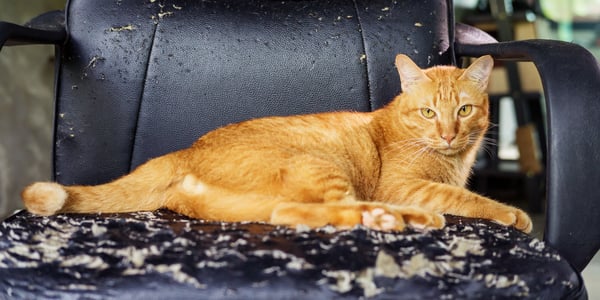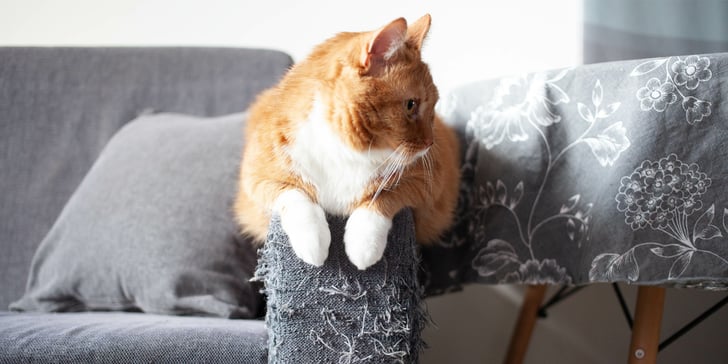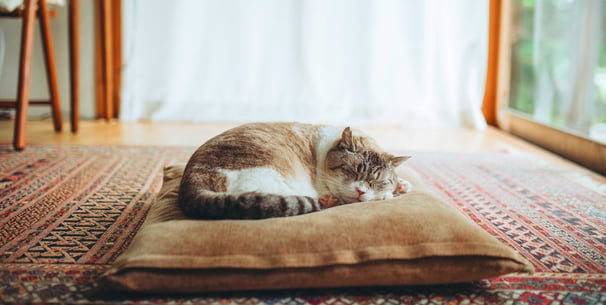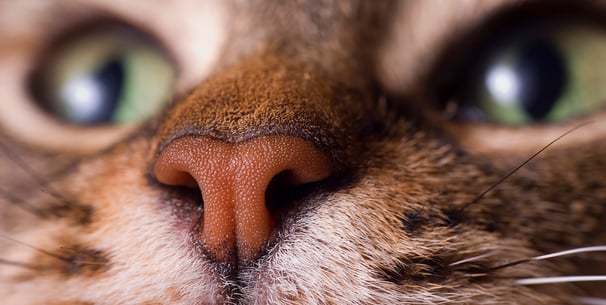You may not always feel like you're in sync with your pet, and that's fine. We've collected all the information we think might help you to reach peak pet parent. Subscribe to get the freshest posts, straight to your inbox.
Waggel's Guide: How to Stop Cats From Scratching Furniture
Index:



So, why do cats scratch furniture?
Nobody wants to come home and find their home ruined by a cat's sharp claws, with claw marks or destructive scratching on a daily basis.
Scratching is a common problem for cat owners. It's not only frustrating, but it can also be pretty expensive to repair or replace tables, sofas and curtains over and over again.
It's often believed that cats scratch the furniture because they're incredibly critical of bad interior design or naughty or trying to be destructive. But before you get too upset with your feline furniture annihilator, remember that scratching is a perfectly natural behaviour for cats.
Although, that doesn't really help your sofa.
There are, however, cunning ways to stop cats from scratching furniture. Before we press on any further, it's important to understand why they scratch in the first place.
By understanding why you'll be better equipped to address the issue more effectively.
In this blog post, we'll explore the possible reasons behind your furry friend's scratching antics and give you some valuable tips on how to stop excessive scratching.



Why having claws and scratching is important to cats
Believe it or not, our feline friends don't just have claws for the sake of being sharp and dangerous (although they are both of those things). Cats use their claws for climbing, balance, defence and to help them catch prey.
They also use them for scratching, but why? A cat scratching their claws happens for a variety of important purposes, including:
Removing the dead layer of claw
Just like our own nails, a cat's claws grow continuously. To keep them a healthy length, cats need to regularly remove the outer layer of their claws. Scratching is one way that cats do this.
Stretching and exercising their muscles
As with scratching, stretching is an important part of keeping a cat's muscles healthy. Cats often stretch by scratching furniture, carpets, or other objects.
Marking their territory
Cats have scent glands between their claws that leave behind their personal scent mark when they scratch. Leaving both their scent and the scratch marks lets other cats know that this territory is theirs.
Satisfying their instinctual needs
Scratching is a natural behaviour for cats, and weirdly most of them find it enjoyable. The texture of carpets or furniture coverings, the shape of furniture, and even the sound of nails scratching against a surface can all be stimulating and pleasurable for cats.
For protection
Cat's claws are their first line of defence against predators. By keeping them sharp, cats can ensure that they're ready to fight or flee at a moment's notice by climbing trees and other structures to escape.
For hunting prey
An important part of a cat's hunting arsenal is its claws. They're essential for cats to capture prey while also giving them traction and making it easier for them to keep pace.
Cats have loads of reasons to scratch up your personal belongings. And while it might be frustrating for us as cat owners, it's important to remember that this behaviour is natural and necessary for our feline friends.
That being said, this doesn't mean that you have to just accept your furniture being ruined. If you're wondering how to stop a kitten from scratching furniture, there are ways to stop them, which we'll discuss next.



How to stop cats from scratching furniture
If your cat is scratching furniture, there are a few practical things you can do to stop this destructive behaviour.
These include:
Providing alternative scratching surfaces
One of the best ways to stop cats from scratching furniture is to provide them with alternatives. Anything that allows your cat to scratch without damaging your furniture will work. This could be a scratching post, cat tree, or even a piece of cardboard.
Rub your cat's scent on any cat scratching posts to make it more attractive to them by using a cloth or pheromone spray.
Adding alternative mental stimulation will help keep your home in tip-top condition and reduce any bad behaviour.
As with dogs, positive reinforcement and a reassuring atmosphere will help to keep your cat away from their bad scratching habits.
Trimming your cat's claws regularly
Another way to reduce scratches on your furniture is to keep your cat's claws trimmed. Your kitty should have their claws cut every few weeks. You can do this yourself at home or take them to a professional groomer or vet.
Applying a deterrent
There are a variety of commercial products available that can deter cats from scratching furniture. You can also use foil, double-sided sticky tape, or even special anti-scratching sprays. Be sure to read the instructions carefully before applying any of these products to your furniture, as some can be harmful if used incorrectly.
Spraying the area with a citrus-scented spray can work as a deterrent really well. Cats don't like the smell of oranges, lemons, or limes, which can discourage them from attacking your furniture.
You can also make your own handy cat repellent spray at home with just a few ingredients.
Startling your cat when they scratch
If you catch your kitty in the act of scratching furniture, you can startle them by making a loud noise. This won't hurt them, but it will surprise them and may make them think twice about scratching your furniture again.
Cure their boredom
Your cat may have become bored and has taken their frustrations out on your furniture. Try providing them with more toys and opportunities to play. This will keep their previously bored little brains active and distracted from scratching. Also, if your kitty is worn out from playing, they'll be much less likely to be swinging from the curtains than if they were full of energy.
Manage their stress levels
Some cats scratch furniture as a way of dealing with stress. If you suspect this may be the case with your cat, try to identify the source of their stress and address it if possible. This could involve providing more hiding places, using pheromone diffusers, or even changing their diet.
Remove their scent
If your cat has already scratched furniture, you'll need to clean the area to remove the scent. This will deter them from scratching in that same spot again.
Training your cat
With patience and consistency, you can train your cat not to scratch furniture. This will require you to supervise your cat closely and redirect them to a scratching post when they start scratching the furniture. Be sure to reward your cat with some yummy treats or positive reinforcement when they scratch the post instead of the couch.
Talk to your vet
In some extreme cases, cats might scratch furniture due to a medical condition. If you think this may be the case, make an appointment with your vet so that they can assess your cat's health and provide you with guidance on how to help them.
While it may not be possible to completely stop your cat from scratching furniture, you can greatly reduce the amount of damage they do by following the tips above.



Punishing your cat is not the answer
It's important to remember that punishing your cat for scratching furniture is not the answer. This will only serve to make them anxious and could lead to worse behaviour problems in the future.
The best way to stop cats from scratching furniture is by providing them with alternative scratching surfaces and keeping their claws trimmed. With a little patience and effort, you can teach your cat where they should and shouldn't scratch.
Conclusion
You can do a few things to stop cats from scratching furniture. Providing them with alternative scratching surfaces, trimming their claws regularly, and using deterrents are a great start.
Managing your cat's stress levels is another thing you can try. You can talk to your vet if you believe they may have a medical condition compelling them to scratch.
Remember, it's in a cat's natural instincts to scratch - in fact, they need to scratch to keep their claws healthy, protect themselves, and relieve stress. Not only that, but scratching is also a way for cats to mark their territory and communicate with other cats.
You can teach your kitty where they can and can't scratch. All it takes is a little bit of time and effort.
Your cat will be happy they can keep scratching, and you'll be happy that your furniture is no longer shredded to bits.
Waggel Pet Insurance
Need more help? You're in luck if you're a Waggel Pet Insurance member. Along with our excellent coverage, we offer access to a 24/7 online vet to answer all your sticky questions, especially if you need grooming assistance.
Not a member? Why not get a quote now and cover your furry friend for a range of illnesses, all while enjoying our amazing perks and rewards.
Want more like this?
Get updates from us with helpful info, advice, answers to frequently asked questions and much more.
Index:
Related posts:
Get your quote
Along with our excellent coverage, we offer access to a 24/7 online vet to answer all your sticky questions.





